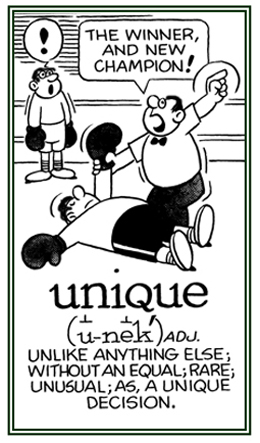uni-, un-
(Latin: one, single; a word element for number 1)
uniped
A person having only one foot (or leg); a one-footed creature.
unipennate
In some muscles, the fibers are oblique and converge, like the plumes of a quill pen, to one side of a tendon which runs the entire length of the muscle.
unipetalous
A corolla rarely consists of one petal, and when this occurs, it depends on the abortion or non-development of others; such a corolla is quite distinct from monopetalous.
uniphonous
Producing only one kind of sound.
uniplicate
unipod
1. One-legged (one-footed).
2. A support for a camera instead of a tripod.

2. A support for a camera instead of a tripod.

unipolar
unipolar electrocardiogram
1. An electrocardiogram taken with the exploring electrode placed on the chest over the heart or upon a single limb, the indifferent ("zero" potential) electrode being the central terminal.
2. An electrocardiogram that shows the potential detected by a single electrode.
2. An electrocardiogram that shows the potential detected by a single electrode.
In practice, this is obtained by using an exploring electrode and a second electrode; such as, a central terminal that is assumed to have zero potential.
unipotent (adjective) (not comparable)
A reference to cells that are capable of developing into only one type of cell or tissue: Unipotent cells produce a single type of daughter cell, for example a unipotent stem cell.
unique (adjective) (not comparable)
1. A reference to something that is unparalleled and the only one of a kind: This wordinfo.info site provides unique resources of vocabulary information for users.
2. Different from others in a way that makes someone or something special and worthy of note: Jillian's job provided a unique opportunity for her to receive a great salary.
3. Limited to a particular person or thing: Many grammarians say that a thing is either unique or "not" unique and so it is incorrect to say that something is "very" unique or "more" unique than someone or anything else.

© ALL rights are reserved.
Go to this Word A Day Revisited Index
2. Different from others in a way that makes someone or something special and worthy of note: Jillian's job provided a unique opportunity for her to receive a great salary.
3. Limited to a particular person or thing: Many grammarians say that a thing is either unique or "not" unique and so it is incorrect to say that something is "very" unique or "more" unique than someone or anything else.
Writers should be aware that such constructions as most unique, etc. will result in harsh criticism or disapproval by better educated readers.
4. Etymology: from Latin unicus, "only, single, sole, alone of its kind," from unus "one."
Go to this Word A Day Revisited Index
so you can see more of Mickey Bach's cartoons.
unique (redundant version)
Pleonasms or redundancies include: totally unique; completely unique, very
unique, and most unique.
Unique is unique; that is, it is one of a kind; and any other modifier is unnecessary and it is even considered to be an error in English usage!
unique identifier, UID
A serial number that identifies the transponder.
The U.S. Department of Defense has also developed an identification scheme called UID.
uniquely
uniqueness
1. Being the only one of its kind or being the only one of a particular type; single; sole.
2. Without an equal or equivalent; unparalleled.
2. Without an equal or equivalent; unparalleled.
Unique is normally meant to describe an absolute state; that is, one that cannot be qualified; thus, something is either unique or not unique; it cannot be rather unique or very unique.
uniradiate


